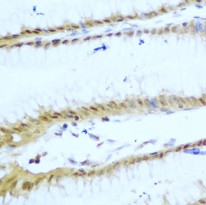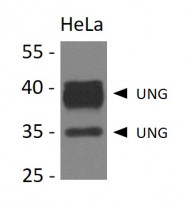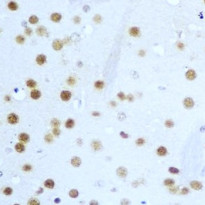ARG59528
anti-UNG antibody
anti-UNG antibody for IHC-Formalin-fixed paraffin-embedded sections,Western blot and Human,Mouse
Overview
| Product Description | Rabbit Polyclonal antibody recognizes UNG |
|---|---|
| Tested Reactivity | Hu, Ms |
| Tested Application | IHC-P, WB |
| Host | Rabbit |
| Clonality | Polyclonal |
| Isotype | IgG |
| Target Name | UNG |
| Antigen Species | Human |
| Immunogen | Recombinant fusion protein corresponding to aa. 1-313 of Human UNG (NP_550433.1). |
| Conjugation | Un-conjugated |
| Alternate Names | Uracil-DNA glycosylase; HIGM4; HIGM5; UNG1; UNG2; UNG15; UDG; DGU; EC 3.2.2.27 |
Application Instructions
| Application Suggestion |
|
||||||
|---|---|---|---|---|---|---|---|
| Application Note | * The dilutions indicate recommended starting dilutions and the optimal dilutions or concentrations should be determined by the scientist. | ||||||
| Positive Control | HeLa | ||||||
| Observed Size | 35 kDa, 40 kDa |
Properties
| Form | Liquid |
|---|---|
| Purification | Affinity purified. |
| Buffer | PBS (pH 7.3), 0.02% Sodium azide and 50% Glycerol. |
| Preservative | 0.02% Sodium azide |
| Stabilizer | 50% Glycerol |
| Storage Instruction | For continuous use, store undiluted antibody at 2-8°C for up to a week. For long-term storage, aliquot and store at -20°C. Storage in frost free freezers is not recommended. Avoid repeated freeze/thaw cycles. Suggest spin the vial prior to opening. The antibody solution should be gently mixed before use. |
| Note | For laboratory research only, not for drug, diagnostic or other use. |
Bioinformation
| Database Links | |
|---|---|
| Gene Symbol | UNG |
| Gene Full Name | uracil DNA glycosylase |
| Background | This gene encodes one of several uracil-DNA glycosylases. One important function of uracil-DNA glycosylases is to prevent mutagenesis by eliminating uracil from DNA molecules by cleaving the N-glycosylic bond and initiating the base-excision repair (BER) pathway. Uracil bases occur from cytosine deamination or misincorporation of dUMP residues. Alternative promoter usage and splicing of this gene leads to two different isoforms: the mitochondrial UNG1 and the nuclear UNG2. The UNG2 term was used as a previous symbol for the CCNO gene (GeneID 10309), which has been confused with this gene, in the literature and some databases. [provided by RefSeq, Nov 2010] |
| Function | Excises uracil residues from the DNA which can arise as a result of misincorporation of dUMP residues by DNA polymerase or due to deamination of cytosine. [UniProt] |
| Cellular Localization | Isoform 1: Mitochondrion. Isoform 2: Nucleus. [UniProt] |
| Calculated MW | Isoform 1: 34 kDa Isoform 2: 35 kDa |
| PTM | Isoform 1 is processed by cleavage of a transit peptide. [UniProt] |
Images (3) Click the Picture to Zoom In
-
ARG59528 anti-UNG antibody IHC-P image
Immunohistochemistry: Paraffin-embedded Human stomach stained with ARG59528 anti-UNG antibody at 1:100 dilution.
-
ARG59528 anti-UNG antibody WB image
Western blot: 25 µg of HeLa cell lysate stained with ARG59528 anti-UNG antibody at 1:1000 dilution.
-
ARG59528 anti-UNG antibody IHC-P image
Immunohistochemistry: Paraffin-embedded Mouse brain stained with ARG59528 anti-UNG antibody at 1:100 dilution.








